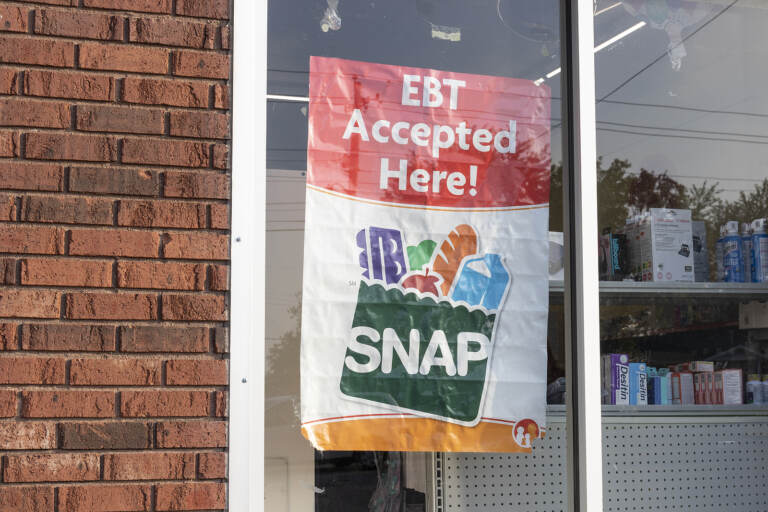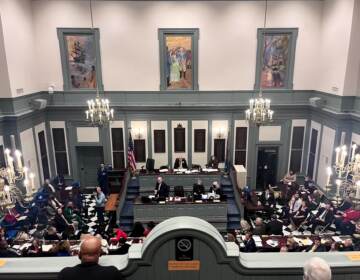Delaware social service providers prepare for reduction in pandemic-era extra help
Many of the benefits and services made available as a result of the pandemic will be phased out once the Public Health Emergency is lifted.

(Jonathan Weiss/BigStock)
The COVID-19 pandemic has changed everything. What should we know about how you approach the world now? How has the pandemic changed your social life, your work life, your interactions with your neighbors? Get in touch here.
Earlier this month, Governor John Carney issued his eleventh extension of the Public Health Emergency he first initiated in March 2020 at the outset of the COVID-19 pandemic. While it’s not clear how much longer those extensions will continue to be issued, the end of the special emergency status will have a big impact on residents.
Many of the benefits and services made available as a result of the pandemic will be phased out once the Public Health Emergency is lifted.
Emergency declarations from both the federal government and the state “really allowed us to have flexibility in already existing services that were in place prior to the pandemic,” said Daniel Walker, deputy secretary for the Department of Health and Social Services.
Those extra services made available in response to the pandemic include expanded access to Medicaid, a waiving of family copayments for child care, and expanded benefits under the Supplemental Nutrition Assistance Program, and added help under two cash assistance programs: Temporary Assistance for Needy Families and General Assistance.
“This will impact families,” Walker said, but calls it a transition to normalcy.
The end to these services could have serious ramifications for Delawareans getting help buying food through the SNAP and P-EBT benefits. “Families will not receive the enhanced allotment that they have been receiving,” Walker said.
“A lot of people are going to be upset and confused,” said Maria Anderson, a 25-year-old single mother from Newark. Anderson gets help from DHSS that include Purchase of Care and SNAP benefits.
“I’m already just kind of getting by, so every little bit counts,” she said. The extra help allowed her to focus on other expenses, but as the enhanced services might come to an end, she’s “going to have to figure out how to push a bill back.”
“Daycare is very expensive if I didn’t have Purchase of Care,” Andersen said of the program that helps parents pay for child care while they’re working or in job training. “Parents at his daycare pay out $1,100 a month for their child. And as for me, I only pay 456 a month for him,” she said.
On a positive side, DHSS is assessing services added during the pandemic to see if some of them can continue once the PHE is lifted.
“Honestly, right now, it’s sink or swim,” said Andersen. Mothers like Andersen are hopeful the additional funds granted with SNAP remain since food inflation keeps rising and “it all really comes down to money and everything is rising. Everything’s increasing, food keeps getting more expensive.”
Access to healthcare for Delawareans who rely on Medicaid will also undergo a transition.
In December 2022, Congress delinked Medicaid enrollment from the federal and state public health emergency.
That means “the continuous coverage requirement that states had to do, meaning we had to keep members enrolled in Medicaid, has ended,” said Steven Costantino, director of healthcare reform for DHSS. That could result in thousands of Delawareans not being eligible to renew their Medicaid in the near future.
According to the Delaware Open Data Portal, before the pandemic, about 235,000 were enrolled in medicaid. As of November 2022, 309,496 Delawareans are enrolled in Medicaid.
Castantino still encourages those in need of healthcare coverage enroll in Medicaid. If they don’t meet eligibility requirements, “I would encourage them to enroll in the marketplace.”
Walker emphasizes that the number of people in need of assistance has increased, and DHSS is working to better educate Delawareans on the purpose of these assistance programs.
While the return to a more normal level of services will likely cause some confusion and anger, DHSS leaders say there are other community partners and stakeholders who can step in to assist with community needs and guide Delawareans toward more help.
WHYY is your source for fact-based, in-depth journalism and information. As a nonprofit organization, we rely on financial support from readers like you. Please give today.





![CoronavirusPandemic_1024x512[1]](https://whyy.org/wp-content/uploads/2020/03/CoronavirusPandemic_1024x5121-300x150.jpg)


